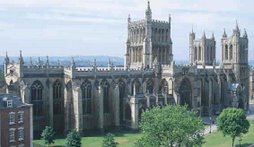Saturday, 28 July 2007
Preces/Responses: Lehman (see our post of July 23)
Psalm 24
Service: Howells - Christ and the Blessed Virgin Mary, Worcester Service
Anthem: Mathias Lift Up Your Heads
Herbert Norman Howells (1892-1983) was born in Lydney, Gloucestershire, the son of an amateur organist. He studied first with Herbert Brewer at Gloucester Cathedral, and later at the Royal College of Music under C.V. Stanford, Hubert Parry and Charles Wood. In 1915 he was diagnosed with Graves' disease and given six months to live. Since doctors believed that it was worth taking a chance on a previously untested treatment, he became the first person in the country to receive radium treatment.
Howells would assist Richard Runciman Terry in editing the voluminous Latin Tudor repertoire that he and his choir were reviving at Westminster Cathedral. He took great interest in this work, absorbing the English Renaissance style which he loved and would evoke in his own, and continued it until joining the faculty of the RCM in 1920. During World War II, he served as acting organist of St John's College, Cambridge.
Howells is particularly known for his large output of Anglican church music, including a complete Service for King's College, Cambridge (the Collegium Regale) and settings of the Magnificat and Nunc dimittis for the choirs of St John's College, Cambridge, New College, Oxford, Westminster Abbey, Worcester (TODAY'S SERVICE MUSIC), St Paul's, and Gloucester cathedrals, among others, as well as for two parish churches, St Mary Redcliffe, Bristol and St Augustine's Church, Edgbaston. These settings are often tailored for the building after which they are named.
William Mathias (1934-1992)was born in Whitland, Carmarthenshire. A child prodigy, he started playing the piano aged three, and composing aged five. He studied at the Royal Academy of Music under Lennox Berkeley, where he was elected a Fellow in 1965. He was professor of music and head of department at the University of Wales, Bangor from 1970 until 1988. He founded the North Wales Music Festival in 1972 and directed it until his death in 1992. He is buried outside St. Asaph cathedral.
Much of Mathias' music was written for the Anglican choral tradition, most famously the anthem Let the people praise Thee, O God written for the 1981 royal wedding of the Prince and Princess of Wales, which had a television audience of an estimated 1 billion people worldwide. "Lift up your heads, O ye gates" is a setting of Psalm 24 depicting the King of Glory's triumphal entry into Jerusalem on a donkey with perky rhythms and dialogue between acapella chorus and organ.
Saturday, July 28, 2007
Subscribe to:
Post Comments (Atom)



No comments:
Post a Comment